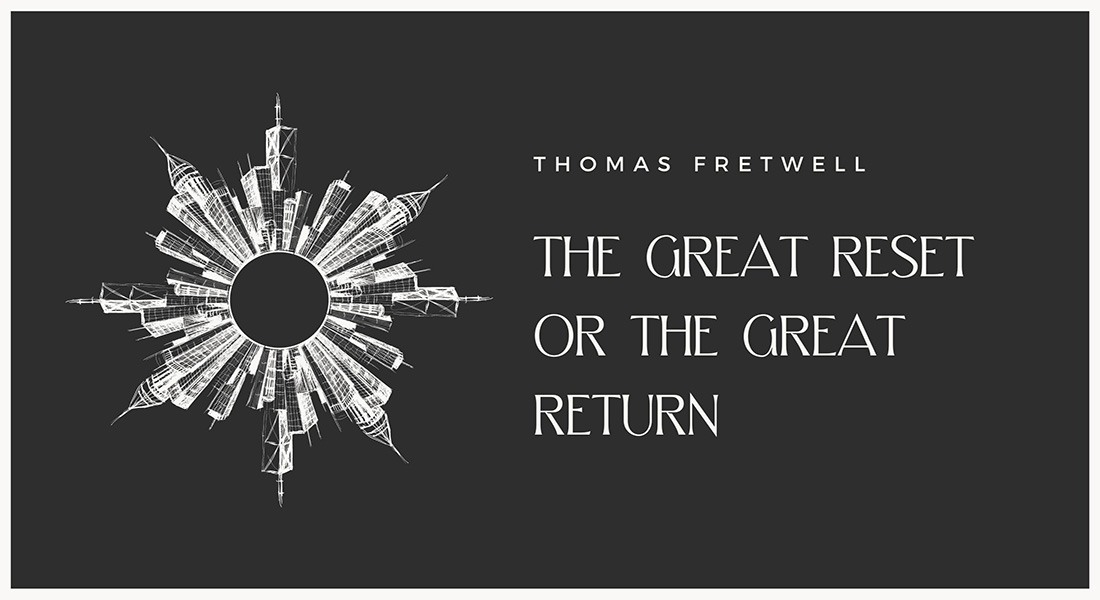
What is the Great Reset?
This previously unknown phrase has become commonplace with the events of the last two years. Everyone from comedians like Russell Brand to royalty like Prince Charles have been talking about the Great Reset. So just what does this term imply? Is it merely the invention of conspiracy theorists, or is it a benevolent economic model, formulated to help solve the world’s problems in the aftermath of the pandemic?
In this brief article, I will attempt to outline the main features of the Great Reset in their own words and then focus on how the church can practically respond to some of this information. The term “Great Reset” was coined by the World Economic Forum (WEF). The WEF is basically a global organisation that links the world’s richest private companies together and facilitates their interactions with the governments of the world. It includes companies such as AstraZeneca, Amazon, Barclays Bank, Coca-Cola, Google, Hewlett-Packard, Johnson & Johnson, Pfizer, and PayPal, just to name a few. The forum is best known for its annual meeting in Davos, Switzerland which brings together global leaders to consider the challenges of the world!
Their website says: “The Forum engages the foremost political, business, cultural and other leaders of society to shape global, regional and industry agendas.”1
The Davos agenda for 2021 was “The Great Reset” – so what is this? Quite simply, it is the belief that the major infrastructures of the world (social, political, economic, industrial, environmental) need to be reset. This belief is often summarised with the quote “build back better.” The belief of the WEF is that the global situation caused by the Covid-19 pandemic presents an opportunity to enact this radical reconfiguring of society. The Founder and Executive Chairman of the WEF is Professor Klaus Schwab. He holds multiple doctorates and honorary titles and has been knighted by Queen Elizabeth II. He recently published the book, Covid-19: The Great Reset, in which he states:
“This pandemic represents a rare but narrow window of opportunity to reflect, reimagine, and reset our world.”2
“The societal upheaval unleashed by COVID-19 will last for years, and possibly generations… Many of us are pondering when things will return to normal. The short response is never… In short, we need a Great Reset of capitalism. … for global leaders to shape the future state of global relations, the direction of national economies, the priorities of societies, the nature of business models and the management of a global common interests.”3
The idea of a group of unelected global leaders shaping society for the rest of us is an idea that many people find extremely uncomfortable. A careful look at the world will show this is not just theoretical either. There are a number of themes that form the core of the Great Reset that the WEF is pushing that dominate popular culture today.
Globalism
Firstly, globalism will need to be the ruling model of government. Schwab states, “The more nationalism and isolationism pervade the global polity, the greater the chance that a global governance becomes ineffective.”4 This would mean less sovereignty to individual nation states. Rather, a system directed by a representative body of global governments working closely with the largest private sector companies.
Financial and Economic Reform
Schwab suggests what he calls stakeholder capitalism – “a model I first proposed a half-century ago, positions private corporations as trustees of society, and is clearly the best response to today’s social and environmental challenges.”5
The notion of extremely wealthy individuals and companies, like those who attend Davos and members of the WEF, becoming “trustees of society” is again something that has many people concerned, and rightly so.
Their vision for economic reform is even more radical – and Covid-19 is helping to pave the way for a new economic world order. In order to pay for the Covid crisis, governments are creating money out of thin air, ending up with massive debts and currencies which are not backed by real wealth. The Coronavirus pandemic has created an economic crisis, similar to that caused by World War II. This requires a new monetary world order to reshape the world, according to the WEF. Some of the ideas being pushed for this economic reform are doing away with cash and introducing Central Bank Digital Currencies. This is a form of cryptocurrency used in international trade and finance. China is already creating such a system. Bank of England Governor, Andrew Bailey, has said, “I think in a few years’ time, we will be heading toward some sort of digital currency.”6
The Fourth Industrial Revolution
This is another area Schwab has written about extensively. He envisages this technological revolution as central to the goals of the Great Reset. He states:
“The scale and breadth of the unfolding technological revolution will usher in economic, social and cultural changes of such phenomenal proportions that they’re almost impossible to envisage. The mind-boggling innovations triggered by the fourth industrial revolution, from biotechnology to AI, are redefining what it means to be human… The future will challenge our understanding of what it means to be human, from both a biological and a social standpoint.7
It can lift humanity into a new collective and moral consciousness based on a shared sense of destiny.”
The implications of having our understanding of humanity shaped by the WEF technological revolution will almost certainly be a departure from the biblical truth of humanity as revealed in the Word of God.
The Great Return
So, I have briefly tried to lay out the predominant themes of the Great Reset. The question we now have is: Do we need to be concerned, and how should Christians respond? While this may all sound strangely reminiscent of eschatological scenarios laid out in the Bible, this should not alarm those whose future and destiny is secure in Christ. We know that the institutions of the world are under the sway of the “god of this world” (2 Corinthians 4:4), so we should not be surprised to see what happens when fallen mankind attempts to bring to pass their own utopian vision.
What should we do?
First, be sure in whom you have believed (2 Timothy 1:12) – Do you belong to Christ?
Second, remember the whole counsel of God (Acts 20:27). The larger narrative of scripture reveals that Jesus will return to establish His kingdom (Revelation 19; Daniel 2:35), and nothing will stop that. The Kingdom of God is what we work towards and look forward to.
Third, be actively involved in gospel ministry – this is the work we are called to as ambassadors of Christ (2 Corinthians 5:20). Our commission does not change as the culture veers further away from biblical principles. The Gospel is the answer! It is the greatest need the world has.
“I must work the works of Him who sent Me as long as it is day; night is coming when no one can work” (John 9:4).
Fourth and finally, we need a great return in the church:
“Thus says the Lord, ‘Stand by the ways and see and ask for the ancient paths, Where the good way is, and walk in it; And you will find rest for your souls.‘ But they said, ‘We will not walk in it'” (Jeremiah 6:16).
We need to return to the ancient paths, that is, the Word of God. This is how we are to be salt and light in this world. This will set us apart from the culture and demonstrate that we live for another world and are citizens of a different Kingdom!
This promise of our Lord seems appropriate to end with:
“Peace I leave with you; My peace I give to you; not as the world gives do I give to you. Do not let your heart be troubled, nor let it be fearful” (John 14:27).
Maranatha
Notes:
1 Our mission. World Economic Forum. (n.d.). Retrieved February 22, 2022.
2 Schwab, Klaus. Covid-19: The Great Reset (Forum Publishing: Geneva, 2020), 244.
3 Ibid, 12.
4 Ibid, 114.
5 Schwab, Klaus. Founder and Executive Chairman. “Why We Need the ‘Davos Manifesto’ for a Better Kind of Capitalism.” World Economic Forum, December 1, 2019.
6 Ward, Jill. “Bank of England Debating Digital Currency Creation, Bailey Says.” news.bloomberglaw.com, July 13, 2020.
7 Values and the Fourth Industrial Revolution (Global Agenda Council on Values 2014-2016). September 2016. [WEF White Paper].









